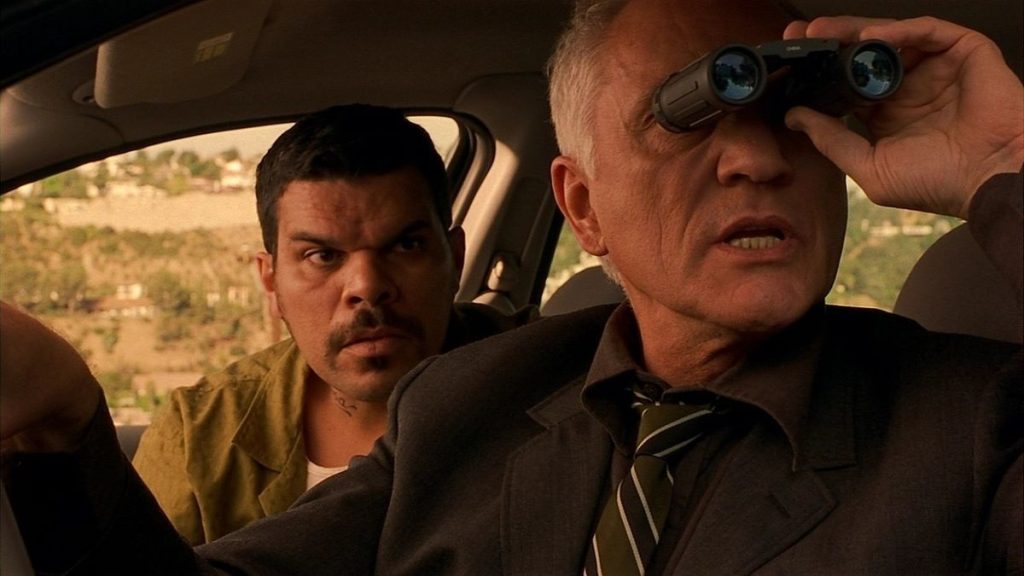Of the many memorable moments in the elliptical neo-noir The Limey, celebrating its 25th anniversary this week, the most notable is both darkly funny and bone-deep terrifying. Because director Steven Soderbergh has always excelled at zigging where everyone else may expect him to zag, the scene in question is largely effective precisely due to what we don’t see. The eponymous ex-con, a terse character named Wilson (Terence Stamp), has traveled across the pond to Los Angeles in the hopes of locating his adult daughter Jenny, and his quest has led him to a group of toughs who do dirty work for a slick record producer. They look at the lanky and older man and see a pest to easily swat aside, a perception he’s able to use to his advantage. After they briefly rough him up, he gets up, pulls a revolver from his belt, re-enters the warehouse where they work, and we hear sounds of a struggle, a series of gunshots, and then one lucky survivor who runs away as Wilson walks into the daylight, blood spattered on his face, and almost hissing in fury, “You tell him I’m coming!”
The Limey is a fairly straightforward revenge narrative made a lot more fascinating through Soderbergh’s jumpy style, aided by editor Sarah Flack, which places scenes and sometimes single shots out of place to keep us guessing as well as to put us into Wilson’s fractured perspective, splintered in the past before he went away to prison as a younger man. (Those glimpses of Wilson’s past being directly pulled from an early starring role of Stamp’s only heightens the sense of displacement.) But at all times, it needs to be pretty emphatically clear that Wilson is a man capable of intense and unforgiving violence. Some of this can be credited to the script by Lem Dobbs (though he famously took issue with how Soderbergh blended his script around in the final edit, as detailed in the duo’s compelling and tense commentary track), but a lot of it is due to Stamp’s fierce and mostly silent performance.
The only time Wilson opens up to chat, in a slang-laden monologue to a deadpan but bewildered federal agent played by Bill Duke, it’s goofy and mildly ridiculous. But in most of his interactions, Wilson cuts a singularly disturbing, laconic, and unrelenting figure. His blue eyes take on a sharklike quality as he sizes up that music producer (Peter Fonda, also riffing on his countercultural status) and his fixer (Barry Newman of Vanishing Point), smelling blood in the water. By the film’s end, Wilson seems as scary as possible, and while the people he dispatches are worse than him in some ways, he mostly seems like the kind of criminal who’s only good if he likes you.

Though Soderbergh and Stamp have — in separate interviews at Rolling Stone and NPR, respectively — talked more about how the film came together as a response of some kind to the Swinging Sixties culture that the leads had once embodied, The Limey still stands tall as much for the distinctive editing as for Stamp’s boogeyman-esque performance. That so many different types of tough guys can face off against Wilson and quickly realize they’re overmatched just as they bite the big one is a testament to how scary this guy is. Perhaps the most remarkable yet bleakly funny death comes in the background of a shot at the producer’s swanky Hollywood Hills abode, as Wilson all but shoves a large security guy over a railing overlooking a canyon to his death, without seemingly breaking a sweat.
1999 ended up being a very good year for Terence Stamp, at least in terms of showing up in a slew of unique offerings (such as supporting roles in Star Wars — Episode I: The Phantom Menace and Bowfinger), but this was the perfect capper to remind audiences of his deep well of frightening intensity. (That said, it’s worth noting that Newman also appears in a supporting role in Bowfinger, and that he, too, comes across a lot differently in that film.) The Limey was something of a bridge film for Steven Soderbergh between some of his biggest mainstream hits; Out of Sight arrived the previous summer, and in the following 24 months, he would direct Erin Brockovich, Traffic, and Ocean’s Eleven.
But while The Limey might feel from the outside in like the more personal half of the “One for them, one for me” mantra the filmmaker adopted in the 2000s, its secret sauce is the committed and never unwavering work from his lead actor. Terence Stamp got a huge rush of a second wind to his career in the 21st century, and largely thanks to the bringer of death who he embodied so precisely and brilliantly 25 years ago, shining darkly through the breathless editing to create an indelibly scary antihero.
“The Limey” is streaming on Tubi, PlutoTV, Hoopla, and FreeVee. It is also available for digital rental or purchase.

